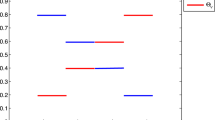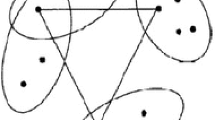Abstract
This paper considers the problem of assigning target locations to be visited by mobile robots. We formulate the problem as a multiple-depot multiple traveling salesman problem (MD-MTSP), an NP-Hard problem instance of the MTSP. In contrast to most previous works, we seek to optimize multiple performance criteria, namely the maximum traveled distance and the total traveled distance, simultaneously. To address this problem, we propose, FL-MTSP, a new fuzzy logic approach that combines both metrics into a single fuzzy metric, reducing the problem to a single-objective optimization problem. Extensive simulations show that the proposed fuzzy logic approach outperforms an existing centralized Genetic Algorithm (MDMTSP_GA) in terms of providing a good trade-off of the two performance metrics of interest. In addition, the execution time of FL-MTSP was shown to be always faster than that of the MDMTSP_GA approach, with a ratio of 89 %.










Similar content being viewed by others
References
Bérubé JF, Gendreau M, Potvin JY (2009) An exact \(\varepsilon \)-constraint method for bi-objective combinatorial optimization problems: application to the traveling salesman problem with profits. Eur J Oper Res 194:39–50
Bolaños R, Echeverry M, Escobar J (2015) A multiobjective non-dominated sorting genetic algorithm (NSGA-II) for the multiple traveling salesman problem. Decis Sci Lett 4:559–568
Brown EC, Ragsdale CT, Carter AE (2007) A grouping genetic algorithm for the multiple traveling salesperson problem. Int J Inf Technol Decis Mak 6:333347
Carter AE, Ragsdale CT (2006) A new approach to solving the multiple traveling salesperson problem using genetic algorithms. Eur J Oper Res 175:245–257
Cheikhrouhou O, Koubâa A, Bennaceur H (2014) Move and improve: a distributed multi-robot coordination approach for multiple depots multiple travelling salesmen problem. In: IEEE international conference on autonomous robot systems and competitions (ICARSC) 2014, IEEE, p 28–35
Deb K, Pratap A, Agarwal S, Meyarivan T (2002) A fast and elitist multiobjective genetic algorithm: NSGA-II. IEEE Trans Evol Comput 6:182–197
Fazli P, Davoodi A, Pasquier P, Mackworth AK (2010) Complete and robust cooperative robot area coverage with limited range. In: 2010 IEEE/RSJ international conference on intelligent robots and systems (IROS), p 5577–5582
Helsgaun K (2012) LKH. http://www.akira.ruc.dk/~keld/research/LKH/
Ke L, Zhang Q, Battiti R (2013) MOEA/D-ACO: a multiobjective evolutionary algorithm using decomposition and antcolony. IEEE Trans Cybern 43:1845–1859
Khamis AM, Elmogy AM, Karray FO (2011) Complex task allocation in mobile surveillance systems. J Intell Robot Syst 64:33–55
Kirk J (2011) Traveling-salesman-problem-genetic-algorithm. http://www.mathworks.com/matlabcentral/fileexchange/13680-traveling-salesman-problem-genetic-algorithm
Kivelevitch E (2011) MDMTSPV_GA—multiple depot multiple traveling salesmen problem solved by genetic algorithm. http://www.mathworks.com/matlabcentral/fileexchange/31814-mdmtspv-ga-multiple-depot-multiple-traveling-salesmen-problem-solved-by-genetic-algorithm
Kivelevitch E, Cohen K, Kumar M (2013) A market-based solution to the multiple traveling salesmen problem. J Intell Robot Syst 72:21–40
Koubâa A, Trigui S, Châari I (2012) Indoor surveillance application using wireless robots and sensor networks: coordination and path planning. In: Mobile Ad Hoc Robots and Wireless Robotic Systems: Design and Implementation: Design and Implementation, pp 19–57
Liu W, Li S, Zhao F, Zheng A (2009) An ant colony optimization algorithm for the multiple traveling salesmen problem. In: 4th IEEE conference on industrial electronics and applications, 2009. ICIEA 2009, p 1533–1537
Mamdani EH, Assilian S (1975) An experiment in linguistic synthesis with a fuzzy logic controller. Int J Man Mach Stud 7:1–13
Marler RT, Arora JS (2010) The weighted sum method for multi-objective optimization: new insights. Struct Multidiscip Optim 41:853–862
Mavrotas G (2009) Effective implementation of the \(\varepsilon \)-constraint method in multi-objective mathematical programming problems. Appl Math Comput 213:455–465
Nikolić I (2007) Total time minimizing transportation problem. Yugosl J Oper Res 17(1):125–133
Pippin C, Christensen H, Weiss L (2013) Performance based task assignment in multi-robot patrolling. In: Proceedings of the 28th annual ACM symposium on applied computing, p 70–76
Sariel S, Erdogan N, Balch T (2007) An integrated approach to solving the real-world multiple traveling robot problem. In: 5th international conference on electrical and electronics engineering
Seshadri A (2006) A fast elitist multiobjective genetic algorithm: NSGA-II. MATLAB Central 182
Shim VA, Tan KC, Tan KK (2012b) A hybrid estimation of distribution algorithm for solving the multi-objective multiple traveling salesman problem. In: 2012 IEEE congress on evolutionary computation (CEC), p 1–8
Shim VA, Tan KC, Cheong CY (2012a) A hybrid estimation of distribution algorithm with decomposition for solving the multiobjective multiple traveling salesman problem. IEEE Trans Syst Man Cybern C Appl Rev 42:682–691
Singh A, Baghel AS (2009) A new grouping genetic algorithm approach to the multiple traveling salesperson problem. Soft Comput 13:95–101
Takagi T, Sugeno M (1985) Fuzzy identification of systems and its applications to modeling and control. IEEE Trans Syst Man Cybern 1:116–132
Trigui S, Koubâa A, Cheikhrouhou O, Youssef H, Bennaceur H, Sriti MF, Javed Y (2014) A distributed market-based algorithm for the multi-robot assignment problem. Proced Comput Sci 32:1108–1114
Trigui S, Koubâa A, Ben Jamâa M, Châari I, Al-Shalfan K (2012) Coordination in a multi-robot surveillance application using wireless sensor networks. In: 16th IEEE mediterranean electrotechnical conference (MELECON), IEEE, p 989–992
Wang X, Liu D, Hou M (2013) A novel method for multiple depot and open paths, Multiple Traveling Salesmen Problem. In: 11th IEEE international symposium on applied machine intelligence and informatics (SAMI), IEEE, p 187–192
Xu Z, Li Y, Feng X (2008) Constrained multi-objective task assignment for UUVs using multiple ant colonies system. In: ISECS international colloquium on computing, communication, control, and management, 2008. CCCM’08., vol 1, p 462–466
Yousefikhoshbakht M, Didehvar F, Rahmati F (2013) Modification of the ant colony optimization for solving the multiple traveling salesman problem. Roman Acad Sect Inf Sci Technol 16:65–80
Zadeh LA (1965) Fuzzy sets. Inf Control 8:338–353
Zadeh LA (1975) The concept of a linguistic variable and its application to approximate reasoningI. Inf Sci 8:199–249
Zhang Q, Li H (2007) MOEA/D: a multiobjective evolutionary algorithm based on decomposition. IEEE Trans Evol Comput 11:712–731
Acknowledgments
The authors would like to acknowledge the support provided by the National Plan for Science, Technology and Innovation (MAARIFAH)—King Abdulaziz City for Science and Technology through the Science and Technology Unit at King Fahd University of Petroleum and Minerals (KFUPM), the Kingdom of Saudi Arabia, award Project No. 11-LE2147-4.
Author information
Authors and Affiliations
Corresponding author
Ethics declarations
Conflict of interest
The authors have no competing financial interest to disclose.
Additional information
Communicated by V. Loia.
Rights and permissions
About this article
Cite this article
Trigui, S., Cheikhrouhou, O., Koubaa, A. et al. FL-MTSP: a fuzzy logic approach to solve the multi-objective multiple traveling salesman problem for multi-robot systems. Soft Comput 21, 7351–7362 (2017). https://doi.org/10.1007/s00500-016-2279-7
Published:
Issue Date:
DOI: https://doi.org/10.1007/s00500-016-2279-7




